https://www.maryedson.com/blog/reflection-what-have-we-learned-since-2020
|
Please check out our sister site for new blog entries. Here's the latest on this topic:
https://www.maryedson.com/blog/reflection-what-have-we-learned-since-2020 My chapter on Teams Systems Theory has just been published in the Handbook of Systems Sciences (2021, Springer). Here is the link and the abstract.
Link: https://link.springer.com/referenceworkentry/10.1007%2F978-981-15-0720-5_29 ABSTRACT: Most organizational research aims to reveal insight into how organizations can be successful. Historically, the focus of much of this research has been on performance and productivity in service to profit and stockholders in for profit enterprises. However, as operating environments have become increasingly competitive, with rapid adoption of technologies and their impact on it, research has widened its scope to include stakeholders, like people and planet, to understand organizational resilience in pursuit of sustainability. Because the cost of education and training has risen rapidly, the urgency to assess, design, develop, implement, and evaluate pedagogy has become vital for not only educational institutions but industry and government. Institutional urgency compels identification of the highest value paths of learning for quantifiable return on investment. Using a systems perspective, this analysis examines the role project teams can have in delivering learning outcomes that provide enduring value to these organizations and their stakeholders. When seen as learning systems, project teams provide an experiential learning approach for sustained, cumulative value. The proposition of team systems theory is tri-fold. First, a model of project teams as complex adaptive social systems is explained based upon four principles of self-organization, hierarchy, emergence, and learning. Second, an analysis examines the value of project teams as learning systems mediated by action research with affinity toward cultivating communities of practice. Third, by leveraging learning of project teams they become a middle-out strategy for embedding a learning culture that develops adaptive capacity for organizational change and resilience. Project teams are appropriate for continuous improvement and organizational learning through development of communities of practice paired participative action research. This analysis of team systems theory delves into the co-created value of project teams in experiential and organizational learning in education, as well as its implications in wider contexts such as profit, nonprofit, governmental agencies, and nongovernmental organizations. Value can be measured in terms of the efficacy of knowledge networks, risk management, and innovation through mixed methods research. Value grows through formal reflection (e.g., formal debriefing conducted with appreciative inquiry as well as process evaluation) at individual member, team, and organizational levels. Team Systems Theory suggests that creating cultures of learning through progression of project teams toward communities of practice builds co-created value and adaptive capacity. Implications of Team Systems Theory include potential for process improvement and enhanced performance through networked knowledge sharing, as well as increased leadership effectiveness through augmented agility and risk management stemming from organizational change generated from the middle out resulting in organization resilience and sustainability. If you are an undergraduate/graduate student, a professional in transition in your career, or a retiree seeking new adventures and you would like to learn more about learned resilience, please check on my website's blog at www.maryedson.com
The 38th International Conference of the System Dynamics Society
Bergen, Norway ◊ July 19-23, 2020 "Hindsight in 2020: Learning from the Past to Inspire the Future" The System Dynamics Society (SDS, see https://www.systemdynamics.org/conference) invites you to join them in Bergen, Norway for the 38th International Conference of the System Dynamics Society. The 2020 conference will honor the 20th anniversary of the 2000 Bergen conference and the long history of system dynamics in Norway, including as host of the inaugural 1976 conference. Whether you are new to the practice of system dynamics or already an expert, you are welcome in Bergen in 2020, where you may contribute your original work and learn from leaders in the field about the state of the art in system dynamics. Submissions are encouraged on all topics relating to the theory and practical application of system dynamics modeling. CONFERENCE THEME The conference theme is “Hindsight in 2020: learning from the past to inspire the future.” The saying that “hindsight is 20/20” implies that it’s easy in retrospect to “see” why events unfolded as they did, but it’s much harder to accurately anticipate the outcome in advance. In the scientific practice of system dynamics, concern about such “hindsight bias” compels us to formalize behavioral expectations a priori, before testing dynamic hypotheses of feedback mechanisms, so that the value of a model for producing new insights can be established relative to these expectations. But after building models, subjecting them to rigorous analysis, and discovering robust model-based policies, a different and deeper kind of hindsight can develop over time. It is this kind of hindsight that we wish to hone in 2020, by asking how what we know now could inform the practice of system dynamics and inspire alternative models that address the challenges our society must face today and tomorrow. In the spirit of this theme, the 2020 conference provides an opportunity to look back at prior models and their evolution in light of recent developments to see how they may inspire future directions for the next generation of models. We particularly encourage reflections on methodological developments related to system dynamics that have arisen thus far in the new millennium. Submissions oriented to the conference theme may offer fresh perspectives on contributors’ own prior work or other computational models that have been developed in system dynamics and related fields. Original contributions may be made by conducting new experiments with existing models, modifying those models to leverage advances in computational methods that have emerged in recent years, or demonstrating innovative model applications that address adaptability and robustness to context. By taking stock of the rich legacy of system dynamics, hindsight can help to build the collective memory of our system dynamics community and thereby inspire strategic directions for the field going forward. The Proceedings of the Eighteenth Biennial IFSR Conversation have been published and are now available for ordering through Amazon.
The overarching theme for the IFSR Conversation 2016 was "Systems Literacy". It aims at developing systemic "principles" or "big ideas" as orienting guidelines for application of systems science in across disciplines and provide for appropriate dissemination and world wide acceptance. Systems Literacy could be defined as understanding your model or models of Systems, how it is the same and different from others' models of Systems, and how our individual and collective actions influence Systems behaviors and how Systems behaviors influence us. An agreed definition will be an outcome of the Systems Literacy Initiative process. The Systems Literacy Initiative is a process of an ongoing international, coordinated effort to create a greater awareness and understanding about "Systems" and to develop a comprehensive set of big ideas, supporting concepts and learning progressions that have broad agreement. As team leaders developed their topics with their teams, they kept a focal theme of Systems Literacy in mind. The intention was that participants in the Conversation integrate the work of the teams into a body of knowledge to be developed into modes for educating those new to systems thinking, the systems sciences, and systems research, as a coordinated and coherent whole system initiative to define and achieve Systems Literacy. Three teams approached Systems Literature from different viewpoints: Team 1: Application of Boulding's Skeleton of Science to Inform Transdisciplinarity, Team 2: Unity in Diversity - Making the Implicit Explicit, and Team 3: Exploring the Relationship of Systems Research to Systems Literacy. The outcome of this Conversation, while at a high conceptual level, also supports and encourages further practical applications through individual member activities. The results are summarized in three executive summaries followed by team papers. Here are links for ordering your copy of the Proceedings of the Eighteenth Biennial IFSR Conversation focused on Systems Literacy. You can order your copy from Amazon at: www.amazon.com/Systems-Literacy-Proceedings-Conversation-Conversations-ebook/dp/B06XHQL7P3 Proceedings of the Nineteenth IFSR Conversation (2018), Systems: From Science to Practice, have been published and are now available through Amazon for purchase. Here is the link:
(https:/www.amazon.com/Systems-Proceedings-Nineteenth-Conversation-Magdalena-ebook/dp/B07S648ZH2/ref=sr_1_1?keywords=IFSR+Conversation&qid=1570204607&sr=8-1 The IFSR Conversations were introduced by Bela H. Banathy around 1980 as an alternative to traditional academic conferences for advancement of thought and learning in the Systems Sciences. The philosophy underpinning the IFSR Conversation is an understanding that participants learn and contribute to others' learning through reflective dialogue only possible face-to-face over extended time. Through dialogue focused on a specific topic, participants share and apply deep knowledge as opposed to formal presentations of papers. The IFSR Conversation 2018 was held in St. Magdalena, Linz Austria, April 8 to 13, 2018. The overarching theme, Systems: From Science to Practice, was an exploration of the confluence between science and practice in the field of systems sciences for the purpose of enhancing the role of the Systems Sciences in support of humans and society. Participants included 26 systemists from ten countries who formed four teams with the following topics: 1. Systems Practice 2. What is Systems Science? 3. Active and Healthy Aging 4. Data Driven Systems Engineering The proceedings contain reports from the four teams together with three personal reflections on IFSR Conversations, as well as a historical survey of the evolution of IFSR Conversations from 1980 to 2018. 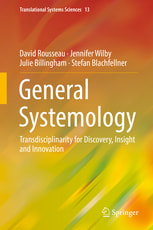 A new publication for your reading pleasure: https://www.springer.com/us/book/9789811008917 Translational Systems Sciences © 2018 General Systemology Transdisciplinarity for Discovery, Insight and Innovation Authors: Rousseau, D., Wilby, J., Billingham, J., Blachfellner, S. This book expands the foundations of general systems theory to enable progress beyond the rich heuristic practices available today. It establishes a foundational framework for the development of scientific transdisciplinary systems principles and shows how these can amplify the potential of individuals and teams working in multi-, inter- and transdisciplinary contexts or striving to translate their progress across disciplinary boundaries. Three general scientific systems principles are presented, and their relevance to the design, analysis, management and transformation of systems is explored. Applying lessons from the history and philosophy science, this book disambiguates key concepts of general systemology, clarifies the role of general systemology within the field of systemology, and explains how general systemology supports other forms of transdisciplinarity. These insights are used to develop new perspectives, strategies and tools for addressing long-standing challenges to the advancement and transdisciplinary application of general insights into the nature of complex systems. The material presented in this book includes comprehensive models of the structure of systemology as a disciplinary field, the structure and significance of the general systems worldview, and the role of general systemology as the heart of systems science, systems engineering and systems practice. It explains what a fully-fledged general theory of systems would look like, what its potential is, what routes are available to us to develop it further, and how to leverage the knowledge we have attained so far. Many examples and analogies show how general systemology has the potential to enable scientific discovery, insightful theory building, and practical innovation in all the disciplines as they study, design, nurture or transform complex systems. This book is essential reading for anyone wishing to master the concepts, terminology, models and strategies needed to make effective use of current general systems knowledge and to engage in the further development of the philosophy, science, and practice of general systemology. International Federation for Systems Research c/o OSGK – Austrian Society for Cybernetic Studies Freyung 6/6, A-1010 Vienna Austria Tel +43 664 28 29 978 [email protected] URL: http://www.ifsr.org Announcement: Themes and Teams for the Nineteenth IFSR Conversation Linz, Austria Sunday, 8 April – Friday, 13 April, 2018 The Executive Committee of the International Federation for System Research is pleased to announce the themes and teams for the Nineteenth IFSR Conversation in Linz, Austria, which will be held at the Seminarhotel, St. Magdalena, Linz, Austria. Thanks to all members of the IFSR community who submitted topics for consideration this year. We had a significant number of excellent submissions, so it was a challenge to choose the most timely and relevant. The final topics, teams, and team leaders are: 1. Active and Healthy Aging – Gerhard Chroust and Shankar Sankaran Demographic changes especially in the Developed World make aging one of today’s growing concerns. The aim is to foster Active and Healthy Aging (AHA) in a sustainable society. Support for AHA has to compensate for more or less insufficient capabilities of Seniors. This is a highly interdisciplinary challenge which involves practically all domains of life: physiology, medicine, psychology, social sciences, society, technology, logistics, infrastructure, architecture, economy, etc. 2. What is Systems Science? - Gary Smith and Jennifer Makar After decades of development in the field of systems science, multiple perspectives, synergies, conceptualizations, and practice from diverse sources and backgrounds indicate a possibility of emerging coherence. We will bring together thought leaders to explore how these various threads can weave together into a more integrated understanding to make progress towards the unification of systems science as a coherent system for application in a variety of contexts. 3. Self-Transgressive Exploration of Next Generation Science Standards and General Systems Theory - Jennifer Wilby In recent years efforts to develop General Systems Theory and efforts to reveal unity in science have largely been pursued in isolation from each other and even further fragmented within those two main areas of endeavor. The Next Generation Science Standards (NGSS) were developed in a broad collaboration, which included the National Research Council, National Science Teachers Association, the American Association for the Advancement of Science. This conversation will encompass a systematic exploration of how these two independent bodies of work can benefit from cross-fertilization, resulting in visual mapping outputs and written narrative that are an incremental contribution to realizing the original intentions of GST. 4. Systems Practice – Nam Nguyen and Constantin Malik This team will comprise systems practitioners who will share their experience of applying systems approaches in practice. The team will also be discussing how to make systems approaches, systems tools more applicable to their respective fields and practice, with specific potential cases such as community healthcare in the US, transport systems in the EU, public and cyber security in Vietnam, worldwide, etc. 5. Data Driven Systems Engineering Approaches – Ed Carroll Engineering programs (products, technology, processes, and people organization) are often based on the structures and plans of previous programs, whether (or not) those past programs were successful. Little consideration is given to whether those past program processes, tools, technology, people, or organizations are optimally suited for the new product or processes. This conversation focuses on the data, processes and systematic approaches that have been successful to transform an engineering program toward a fully digital engineering environment, examining approaches such as a model-based engineering. Please join us in congratulating these teams on the acceptance of their topic proposals. They can now begin preparations for the Conversation. Questions about the 19th IFSR Conversation should be directed Mary Edson at [email protected]. We look forward to a vibrant Conversation in Linz this coming spring. A Guide to Systems Research: Philosophy, Processes and Practice (2016) edited by Edson, Buckle Henning and Sankaran, with authors - Debora Hammond, John Kineman, Louis Klein, Gary Metcalf, and Will Varey, will soon be published by Springer. This book is designed for systems researchers - new and experienced - seeking systemic approaches of inquiry into complex issues, often called messes or wicked problems. The book will be launched at the 60th Annual Meeting of the International Society for the Systems Sciences in Boulder, Colorado (see http://isss.org/world/Colorado_2016). As part of the launch, Springer is making a special offer of 20% off the publisher's price if ordered (hardcover or e-book) by August 27, 2016. If you are interested in Systems Research, be sure to check out the details in the attached flyer. |
AuthorMary Edson, Ph.D., SHRM SCP, SPHR, is an organizational strategist who works with managers, project leaders, and teams to overcome adversity by building adaptive capacity and sustainable systems. Mary is a past president of the International Federation for Systems Research (IFSR). She conducted her doctoral research at Saybrook University in San Francisco, CA. Her research paper reviewing the results of this study received the Sir Geoffrey Vickers Award at the 55th Annual Meeting of the International Society for the Systems Sciences at the University of Hull, U.K. For more about Mary's work as an organizational strategist, go to Leadership Strategies at www.maryedson.com Archives
November 2022
Categories
All
|
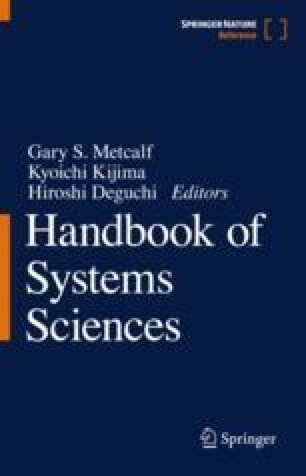
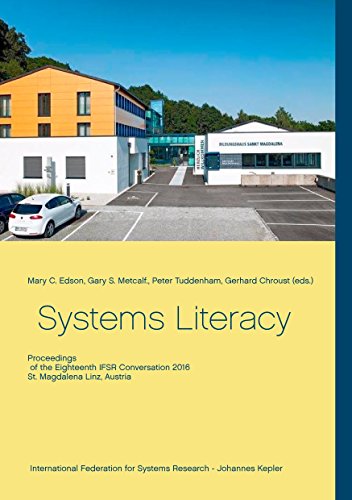
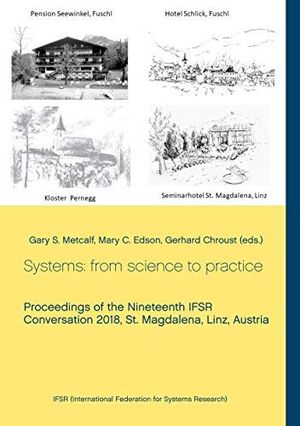

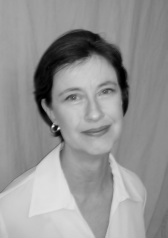
 RSS Feed
RSS Feed
